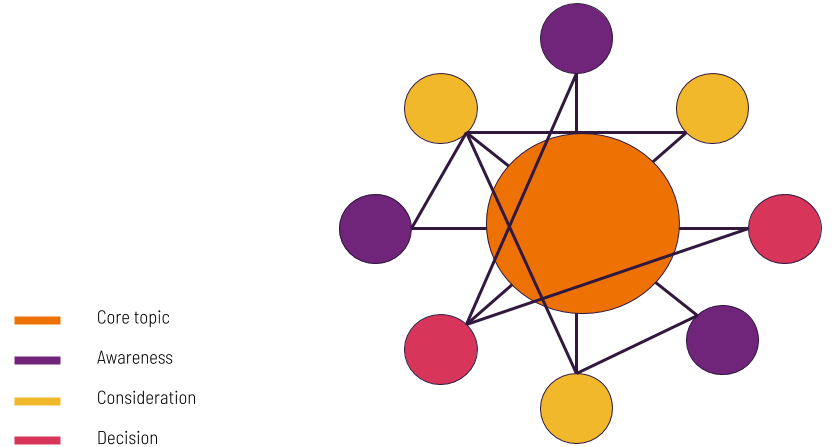What is poor listening costing you and your business?
That’s what I’m exploring this week with my very special guest Oscar Trimboli, who’s aiming to create 100 million deep listeners in the world.
Over 55% of your day is spent listening, yet only 2% of us have actually been trained on how to listen.
There’s no shortage of speaker training out there, but the other half of communication is listening. And that’s what Oscar is teaching today on the podcast.
In my conversation with Oscar we cover a wide range of topics including how to become a deep listener, practical tips on how to not neglect your existing customers and how to listen to what your customers are not saying.
So please enjoy listening to this episode about listening with Oscar Trimboli.
What you will learn

- How to become a deep listener
- Practical tips on how to not neglect your existing customers
- Acquiring a new customer can cost five times more than retaining an existing customer.
- How to listen to what your customers are not saying
- Learning to listen to what’s unsaid
- Why the magic phrase is ‘Tell me more’ and ‘I’m curious what else you’re thinking about on that topic.’
- The 5 different levels of listening
- How to take notes in meetings (this is really cool!)
- ‘If your goal can be achieved in your lifetime, it’s not worth going for.’
Resources mentioned in this episode

Deep Listening: Impact Beyond Words by Oscar Trimboli
Oscar’s Deep Listening Podcast
oscartrimboli.com
We speak at about 125 to 150 words a minute. You can listen right now at 400 words a minute, but as a speaker, I can think at up 900 words a minute.
Jason Calacanis – This Week in Startups Podcast
Boris Conrad – World memory champion
Book recommendations
Deep Listening: Impact Beyond Words by Oscar Trimboli
What business you would build on Mars?

I think this is a transformational time in commerce. It means that Martians and people from the Earth will be able to trade for the first time. I don’t know if it’s Bitcoin, but we would need to set up a currency or rate of exchange between the two planets. What we need to do is figure out how do we transact across the galaxy? I hope that will be valuable to both marketplaces, and I know that creating a double sided marketplace is probably the hardest thing you can ever do in software development.
But in terms of promoting it, I just think that we need to get the Elon Musk of Mars, and the Elon Musk of Earth do the first trade together, and just record that in some kind of medium that both planets can see and hopefully that will set off a process of trade that will make both planets closer together.
Get in touch with Oscar
Transcript

Brendan Hill: Oscar, welcome to the show.
Oscar Trimboli: Brendan, I’m really looking forward to listening to your questions.
Brendan Hill: I’m under a bit of pressure today. As a podcast host, you’re going to be judging my listening. So, it’s your goal to create 100 million deep listeners. Can you tell me about the moment that you realized that you wanted to make this your life’s work?
Oscar Trimboli: A series of events that happened in a boardroom at Microsoft about 11 years ago, where somebody pulled me aside at the end of a very complex, conflict filled meeting between our head office and our local office, and my vice president at the time, Tracey, said, “Can you stay behind at the end of this meeting?” I went, “Oh, that ain’t good.” That’s kind of like when your wife says to you, “We need to talk.”
Oscar Trimboli: Tracey sat down with me and she said, “Hey, did you notice what you did at the 25 minute mark? You just completely changed the course of this meeting.” I went, “No, I didn’t.” She goes, “The way you listened to what people weren’t saying was transformational. That will have a huge impact in the world. Can you figure out how to code that?” I said, “Tracey, do you mean code code, or code?” Because I’m working at Microsoft, and code means write software.
Oscar Trimboli: She said, “Code code” and I went, “Okay.” I walked out of that room never thinking another thing about it, Brendan, until about six weeks later, where the opposite meeting happened. We had to take the budgets that we were given by head office and talk to our field sales organization and get them to accept what we’d been given. Same thing happened, expect I was in a meeting with a chief operating officer, and the chief financial officer, and Brian, the chief financial officer said to me after the meeting, “Can you teach me how to do that?” I said, “What do you mean, Brian?”
Oscar Trimboli: He said, “When you did that at about 40 minutes into the meeting, the way you heard all points of view in the meeting, I want to know how to do that.” I go, “Honestly Brian, I have no idea how.” He said, “Well, I’m not going to let you off the hook.” Wind the clock forward another seven years and I decide that listening is something that can transform the world. The 20th century we’ve been taught how to speak. There’s no shortage of speaker training out there, but the other half of communication is listening.
Oscar Trimboli: A mentor of mine said to me, it was July, about this time of the year, and said, “What is your goal?” I said, “A million deep listeners in the world.” Matt laughed at me and just went, “Are you joking?” I said, “What do you mean?” He goes, “Add a zero.” I was completely freaked out. I went, “10 million? I can’t make sense of that.” He goes, “Come back next month, let’s have a chat.”
Oscar Trimboli: I came back next month and said, “Yeah, 10 million, I can see how to do that.” He went, “Great. Add a zero.”
Brendan Hill: Wow.
Oscar Trimboli: I went, “Are you joking?” He said, “No.” He says, “If your goal can be achieved in your lifetime, it’s not worth going for.” I thought about that and I went, “Wow. 100 million deep listeners in the world.” Today, I can see it’s possible with technology. I can see it’s possible with a global network that I started to develop through my work as a writer and books and games that I’ve developed, and podcasts, and in the long term, I’ve got a lot of pressure from a lot of organizations that I consult to to make this into virtual reality, to make it into an Alexa or Google App with voice activation.
Oscar Trimboli: If you can imagine a scenario, Brendan, where you say, “Hey Alexa” or, “Hey Siri, listen to my next conversation, redact anybody’s voice who hasn’t opted in for privacy purposes, and then debrief me on how I went in my next free slot.” Siri rings you and says, “Hey Brendan, do you want the debrief on that meeting?” You go, “Sure, I’m free.” And Siri says, “Four people in the meeting, but only two spoke. What are you doing about listening to the others? Lots of why questions at the beginning of the meeting, but it wasn’t balanced with how and what questions,” and then finally Alexa would point out to you, “Brendan, you interrupted. Here’s a replay of when you interrupted, here’s another replay of when you interrupted.” That’s the short story on 100 million deep listeners.
Brendan Hill: Wow. And so for businesses like Microsoft, I mean can you tell us some stories of what changed after you started to implement your learnings then?
Oscar Trimboli: I think one of the things people always pointed out to me is they always said, “Hey, you’re a good listener, Oscar.” But one of the things I was very deliberate on is as a marketing director, we briefed a lot of advertising agencies and my briefs were always unusual. I would brief agencies in a server room rather than in a boardroom, so I go to a customer site and put them in a server room, which is a dying dinosaur, because most servers are moving to the cloud now.
Oscar Trimboli: But what happened is the CIO, the IT professionals, would come into brief the agency with me and the team, but the agencies would notice one thing. They go, “It’s really cold in here” and I go, “Yeah, why do you think that is?” None of them really understood but what they understood really quickly is temperature mattered, and now they understood why they wear hoodies and puffer jackets when they go into cold server rooms. But equally they said, “They must hate doing patch updates and coming into this room” and because my brief was taking place in the room where the customer actually was, rather than a PowerPoint in a boardroom, the agency was able to listen differently to the brief.
Oscar Trimboli: Our team meetings also once a quarter, we made sure that we went out to our contact center. It was an outsourced contact center, and our team had to go on the contact center for an hour before the team meeting.
Oscar Trimboli: Listen-in only mode, depending. If you’re new to the role, you’d be in listen only mode, but as the team’s confidence developed, some of them actually went into the queues and started answering questions. But what we realized by listening that way was the way we were writing content on the web was completely foreign to our customers. We were using highly technical, very convoluted language. By listening to them in the contact center, we were able to create content that was more relevant to them.
Oscar Trimboli: Wind the clock forward, we started to listen to our resellers, the people who were selling Microsoft products, in a very different way as well. To some extent, that reinforced the way why Microsoft’s adoption of their cloud services in this market was way beyond the per capita consumption that they should be getting in a natural distribution curve.
Brendan Hill: Awesome. That’s some really good stories there. How can small and medium businesses implement deep listening, and what advantages are they going to find?
Oscar Trimboli: Look, some really simple free tools for people to think about here is Google Alerts. Google.com/alerts, punch in the phrase of the organization you’d like to sell to, or the name of a person in that organization you’d love to sell to, and it’s going to give you an email. You’ve got three choices, immediate, daily, or weekly, but for a number of businesses that are smaller businesses, for me what they said is they hate the prospect of calling people cold. Using Google Alerts, you’ve got a reason to call them with something warm.
Oscar Trimboli: You can talk to them about the article, or if you know their email address, which you can guess most these days, you can send them the email saying, “Hey, great article. We help organizations like you,” based on something in the article, so that is the most simple thing that you can do. It doesn’t cost a thing.
Brendan Hill: And it’s surprising, like these days, I can’t think of many examples of people doing that well. We get so many cold emails, LinkedIn messages. No one does this. No one listens.
Oscar Trimboli: Yeah, and I’ll give you a great example. Two years ago, I’d come off stage and someone was going on after me, an expert who was a futurist. They were a speaker. They were a small business and as we were crossing on stage he actually stopped and said, “Hey, can we grab a coffee straight after my speech?” I stayed in and listened to his speech and it was all about future and it was amazing.
Oscar Trimboli: What was most amazing about it was he played a piano and a guitar during the presentation, which was mind blowing as well. But he also did some card tricks. He came to me afterwards and he said, “That thing that you said, that Google Alert. How do I do that?” We literally took out his phone, we did it on his phone, and I said, “But don’t use it only for prospects. Use it for your existing customers as well.”
Oscar Trimboli: In doing that, he realized that he’d been ignoring his existing customers. I think for a lot of small businesses, as we want to get more growth and new customers, we forget the existing customers we’ve got. Wind the clock forward about three weeks later, he used this technique. Now, his client was Siemens, quite a significant, global organization, that he’d forgotten all about.
Oscar Trimboli: He set up a series of alerts on a handful of people that worked at Siemens, and as a result he picked up another consulting assignment just by simply emailing somebody he’d done some work for three years earlier and said, “Great article, it seems like you guys have finally figured out how to connect the past with the future.” He came back and said, “Hey, we’ve got a workshop coming up in a month and a half. You’d be great for half an hour to set the scene” and off he went.
Oscar Trimboli: I think sometimes as smaller businesses, we get lost in what’s new. Let’s not forget the customers we’ve already got, too.
Brendan Hill: Yeah, I mean it’s such a good point you make about customer retention. I guess it’s the whole customer acquisition process, it’s idealized. I mean, it still costs businesses four times as much to acquire a new customer than retain their old one. It’s often overlooked. I mean, what other parts does listening play in I guess cultivating your existing base?
Oscar Trimboli: I think one of the big things I talk a lot about, particularly when I speak and what people come back to me and go, “Wow, I didn’t even get that until you explained it” is listen to what’s not said. A lot of us, when we talk to our customers or potential customers, we hear what they say and we just keep talking over it. But if we think about the simple maths here, Brendan, that we speak at about 125 to 150 words a minute. You can listen right now at 400 words a minute, but as a speaker, I can think at up 900 words a minute.
Oscar Trimboli: I can speak at 125 to 150 on average, let’s just call it 125. I can think at 900, so it means the likelihood that the first thing out of my mouth is what I’m actually thinking, there’s a one in nine chance, or 11%. If every conversation you go into, you’re happy with a roulette wheel of 11% chance of talking to somebody about what they’re actually thinking about, you need to learn to listen to what’s unsaid. It’s the ultimate ninja move of listening, and it’s a really simple phrase. “Tell me more.”
Oscar Trimboli: If you can just say to the person you’re speaking to, “Tell me more,” what you’ll notice, they’ll use these magic code words, and I’m sure you’ve heard them, Brendan. They’ll say words like, “Well actually” or, “You know what? You know what’s really important? You know what I should have told you that I haven’t told you?” I can see you nodding now and your eyes have changed, and the smile’s lit up on your face, for those of you who can’t see Brendan, because it’s true that when people know what they want to say, they use these code words ahead of it.
Oscar Trimboli: But unfortunately for most people, what happens, that conversation happens between pressing the lift button when you’re taking the move from the meeting to the lift. It happens at the end of the phone call, it happens at the end of the team meeting, and it’s too late to do anything about it. But if everybody just practiced and built a muscle around, “Tell me more” or, “I’m curious what else you’re thinking about on that topic” is another really simple phrase you can use, because if you just say, “Tell me more” three times, they’re going to get a bit bored and think you’re not listening.
But, “I’m curious, tell me more.” It’s such a powerful phrase to unlock, and what it means is they move from a position of feeling like you’re hearing them to deeply listening to them. When you create that connection, they often think without you even offering it, because you’ve heard them, that you’ve got the solution. Listening to what’s unsaid is really powerful. But most of us spend over half of our day listening, yet only 2% of us have ever been trained.
So thus my quest, if we can help the world understand the five levels of listening, we can move people from listening in black and white to listening in five dimensional technicolor.
Brendan Hill: What are the five different levels of listening?
Oscar Trimboli: The five levels of listening are level one, listening to yourself. It’s completely counter-intuitive to all the listening literature, but if you’re not available to actually listen to somebody, listening can’t take place. Most of us turn up to a conversation with the last meeting or conversation in our head, what we’ve got to do this afternoon, kids we’ve got to pick up, a laundry list of things. We’ve got to go to the supermarket and sort out, could be bills we need to pay, and it’s happening to you right now.
For you listening right now, you’re completely distracted, whether you’re running, whether you’re in the car, whether you’re walking, whether you’re cooking, listening to this podcast. You’re distracted while you’re listening. That’s completely okay. But level one listening is listening to yourself. Level two listening to the content, whereas most listening literature talks about listening to what you say, what you see, and what you sense. Body language, as well as that.
Level three, listening to the context. At level three, we’re listening for patterns. Do people speak consistently in the past? Do they speak consistently in the future? Do they speak consistently in detail or bigger picture? Do they speak about themselves or their team? If you notice those patterns, you can listen completely differently. Level four, listening for what’s unsaid. We’ve spent a bit of time on that, and then finally, listening for the meaning.
Oscar Trimboli: For most of us, and I’ve done research with 1410 people, it’s a longitudinal survey that’s informing our deep listening app that we’ll build, 86% of people can’t get out of level one listening because they’re so distracted.
Brendan Hill: Wow.
Oscar Trimboli: They’re distracted by devices, they’re distracted by laptops, they’re distracted by phones, and just as importantly, they’re distracted by the conversations in their own head.
Brendan Hill: That’s only getting worse, as well.
Oscar Trimboli: It is, unfortunately. If you want three tips to avoid distraction, number one, switch your phone to flight mode, and number two if you do need to bring a laptop or an iPad or something like that to a conversation, try and use it in a stylist mode where you can actually write graphical notes rather than verbatim notes.
Oscar Trimboli: And then tip number three, I’m so delighted you’ve got it Brendan, a glass of water in every conversation. A hydrated brain is a listening brain. It helps us to get the blood sugars to the brain faster. If you get the distractions away, you get some water in the conversation, and if you drink a glass of coffee, you’re going to have to have an extra glass of water. I’m not saying don’t drink coffee.
Oscar Trimboli: And then finally, the deeper you breathe, the deeper you listen. Just practicing very simple process, before you get to a conversation, even before you meet the person or get into the team meeting, or visiting with a client or a supplier, my practice is put the phone into flight mode and take three deep breaths. In through your nose, and out through your mouth, and you’ll find that that just settles your mind and I ask myself, “What’s my intention?”
Oscar Trimboli: Today, as I was waiting in the lobby out here in at the studio, my intention was how do I visualize who’s in the audience to make sure that we can have a conversation that helps them?
Brendan Hill: Now, it’s a great point about the stylist that you mentioned went to a conference last week and Jason Calacanis was presenting, a famous angel investor, and he mentioned that whenever he goes into a meeting to hear a new pitch, all electronics stay at his desk, he brings in his Moleskine, the notepad, gives that person his full undivided attention and as you said, great place to start deep listening.
Oscar Trimboli: Yeah. And Boris Conrad’s a world memory champion. Did you know there’s such a thing as World Memory Olympics?
Brendan Hill: I did not, no.
Oscar Trimboli: Okay. Imagine this. He’s four time world memory champion. Now, he’s got a couple of things in his favor. He’s German and he’s a neuroscience. What the pinnacle event of the World Memory Olympics is shuffle a deck of cards, and then you have to recite them in the order you saw them. He can do that in under a minute.
Brendan Hill: Wow. 52 cards in under a minute?
Oscar Trimboli: In under a minute, in order.
Brendan Hill: Wow.
Oscar Trimboli: I couldn’t even say them, but he’s got this amazing ability to use what he terms the memory palace. But the point he made when I spoke to him and said to him, taking notes during a meeting, good or bad when it comes to listening? He says it depends on the kind of notes you take. The point he made is take notes for meaning and action, don’t take verbatim notes.
Oscar Trimboli: A lot of us will write the words that somebody said, for example, but he said you hold memory longer if your notes are graphical. If you listen for what they’re meaning and the actions required, you’ll take fewer notes, but the interesting thing is while you’re writing verbatim notes, you’re actually saying those words out aloud in your head, you’re shutting down the auditory cortex of the brain, which connects the ear to the brain, so it means you can’t actually hear when you’re writing down the verbatim notes.
But if you’re doing graphical, which sounds like this angel investor was, you’re present. Your eyes are connecting. You’re hearing not only what they’re saying but what they’re not saying as well.
Brendan Hill: Very interesting. Going back to your mission of creating 100 million deep listeners, for your own business, I mean what are the main roadblocks for you in 2019 and beyond? I mean, how many listeners are you up to at the moment? What’s the plan?
Oscar Trimboli: Yeah. It’s a good question. If you were to come down to my office, there’s a beautiful sticky note map for now to 2030.
Brendan Hill: Wow.
Oscar Trimboli: It’s by 2030, we’ll get to 100 million.
Oscar Trimboli: And the countries are plotted out and the sequence we’re going to do it in, and all of that. Right now we’re up to half a million in the people we’ve touched so far. Me and Nel, my business manager, we do those calculations at the end of every quarter, but three weeks ago, I met a most amazing man, a head of one of Australia’s most successful advertising agencies, and through word of mouth, he’d heard about me and asked me to come in.
Oscar Trimboli: And Nick said to me, “So, 100 million deep listeners by when?” I said, “Oh, by the end of my life” kind of thing. He said, “Well, Oscar, too bad. The planet hasn’t got enough time for you to take that long. You need to do it in the next 10 years.” Can you see this pattern of consistently people compressing my timelines when doing that?
Oscar Trimboli: What I found is as I talk to more people about it, all my plans on the wall are interesting, but it’s all these organic conversations that create step changes in that journey. Nick said to me, “Create a documentary” and he talked to me about an amazing documentary called The Lion’s Share, which they worked with Sir David Attenborough and the United Nations to get .01% of every media spend, where an animal is represented in an ad campaign globally, and used that to buy back forest and jungle.
They raised $40 million last year. They’re on target to raise $100 million for this year, and they’ve recently bought back many, many acres of Indonesian rainforest. My biggest barrier is me. I’ve been deliberate in going, “I don’t want a big team, I don’t want a big organization behind me. I’ve done that in previous life.” And I’m trying to figure out how to do this in a very organic way, in a way that the idea that isn’t my idea, it’s just an idea that’s coming through me, 100 million deep listeners, gets there faster.
My biggest barrier is me, and if you put it in business terms, my biggest business problem is distribution. How do I get this message out in one to many environments rather than typically where I work, one to one environments? So, podcasting, great way to do that. You’re getting out to audiences you’ll never physically meeting, but they’ll be touched by the message. The big challenge for me is how do I get the distribution of this idea out there faster than ever?
Brendan Hill: And another way that you’re doing that is by the written word. I’ve got your book in my hand now called Deep Listening, and we’ll have a link to Oscar’s book in the show notes, after the show. I mean, it was a great little package. It comes with some interactive cards as well. Can you tell us a bit more about the book?
Oscar Trimboli: Yeah, there’s the book, there’s the cards, there’s jigsaw puzzles. One of the things I spent a lot of time with was a lot of adult learning theory experts from around the world, as well as listening professors from around the world. One from Israel, one from the United States, they’re all helping me out and they said as adult learners, their experience needs, if it’s tactile, you can improve the speed at which they learn things, thus the cards and the jigsaw puzzle, and the book.
What you can’t tell from what you’ve said Brendan, the book’s small enough to fit into a handbag or in a carry bag. It’s designed to be read in under an hour. The fastest it’s ever been read is about 42 minutes, and most people read it in about 55. It’s meant to be used. It’s not meant to be a shelf trophy that collects dust. So, originally when I spent time with my editor on this, the second book, we were in a Titanic battle, Kelly and I, about the format of this book because I just said, “Kel, this needs to be read and actioned, not merely just a dust collector.”
Because I’m sure all of us have got a bookshelf full of books that have either been gifted to us or were bought. We’ve read the first couple of pages and fallen asleep, or we’ve read the first couple of pages and put it away. I’ve got amazing photos from people from Germany, from the Netherlands, from Canada, from New Zealand, from Singapore, from China, all taking lovely photos of them and the book in coffee shops typically, going, “I’m really loving the simplicity of this message.”
Every word in that book is really a distillation and the brief for this was dashi, which is Japanese broth, and for those of you who have experienced the brilliant dashi, it’s like a very concentrated soup. It has layers and layers of flavor, but it’s just the essence. This book is just the essence of what deep listening’s all about.
So yeah, if you love to read, check out the book. If you want to have fun and play with the cards, they’re there, too, as well, as well as the jigsaws and the podcast.
Brendan Hill: Definitely looking forward to going over everything on the weekend. Any other books that you’ve read recently that have helped you on your journey?
Oscar Trimboli: I spend way too much time with James Clear, author of Atomic Habits. If he was in my life, my wife would be thinking I’m having an affair with him. I’ve read his book three times. The reason I’m spending so much time with James Clear’s book Atomic Habits is it’s so well written. He took three years to write it, and it’s so practical. His ability to help you understand what gets in the way of great habits being formed, and what keeps you connected to bad habits is really, really potent.
I was fortunate enough a couple of months ago to hear him speak in Sydney, not only about the book, but the process behind the book. He spoke for 45 minutes about the book. We took a break, it was about 150 of us in the room, and then he was interviewed about the process of the book. Originally he planned to write it in a year, but realized it was rubbish. Went back to the publishers and said, “It’s going to take a bit longer” and eventually it took three years, and I’m so glad he took the extra time.
If you’re trying to form a new habit, or you’re trying to break an old habit, this book will deconstruct how to do it, and it will do a million copies in under 12 months which is phenomenal.
Brendan Hill: Wow, yeah.
Oscar Trimboli: To be a New York Times Best Seller, you need to do 250,000, so he’s smashing that number out of the water. Yeah, James Clear, Atomic Habits, is the book that I’m spending a lot of time with.
Brendan Hill: Amazing. We’ll put that one in the show notes as well. Are there any other business resources, any tools, $100 or less, that you’ve used recently in your quest to get 100 million deep listeners?
Oscar Trimboli: Yeah, my fav is Evernote. I just love Evernote. Evernote, when you’re an author, you’re forever reading, and I’m clipping articles all over the place, and what Evernote allows you to do is clip YouTube clips or clip webpages or take photos, but more importantly code them and put tags next to them so you can retrieve them easily. In the process of writing, often times you’ll go, “What was that article about James Clear?” For example. And with Evernote, you can search for that really quickly. All my Evernotes are coded into the five levels of listening, for example.
Oscar Trimboli: But they’re also coded into business context or personal context, so if I ever want to retrieve them there. So, it works on your phone, works on your iPad, works on your laptops. It’s across all devices. It’s a lovely tool that helps my memory, I guess.
Brendan Hill: Yeah. I’m also a big Evernote nerd, as well. We’ll put that link in the show notes, as well. Definitely good for any small and medium business. Oscar, thank you so much for dropping so much value about deep listening. I’ve definitely got a lot of great takeaways. Definitely going to check out the book over the weekend. Got one more question that we like to ask our guests. It’s a bit abstract. Are you ready for launch?
Oscar Trimboli: I’m all ears.
Brendan Hill: You’re on the first flight to Mars with Elon Musk and the first settlers aboard the SpaceX star ship rocket. What business do you start when you land on Mars, and how do you promote it to the new Martians?
Oscar Trimboli: I think this is a transformational time in commerce. It means that Martians and people from the Earth will be able to trade for the first time. I don’t know if it’s Bitcoin, but we would need to set up a currency or rate of exchange between the two planets. What we need to do is figure out how do we transact across the galaxy? I hope that will be valuable to both marketplaces, and I know that creating a double sided marketplace is probably the most hardest thing you can ever do in software development.
But in terms of promoting it, I just think that we need to get the Elon Musk of Mars, and the Elon Musk of Earth do the first trade together, and just record that in some kind of medium that both planets can see and hopefully that will set off a process of trade that will make both planets closer together.
Brendan Hill: Very good answer. Oscar, once again, thank you for all the value you’ve provided today. All the show notes can be found at Metigy.com/podcast. Before we go, was there anything you’d like to say and how can people get in touch and find out more about deep listening?
Oscar Trimboli: If you just go to OscarTrimboli.com/listeningmyths, there you’ll be able to download the five myths of listening, but more importantly what to do about them. If you just go there, that will start your journey to becoming a deeper listener.
Brendan Hill: Amazing. It’s been fun, thanks Oscar.
Oscar Trimboli: Thanks for listening.









